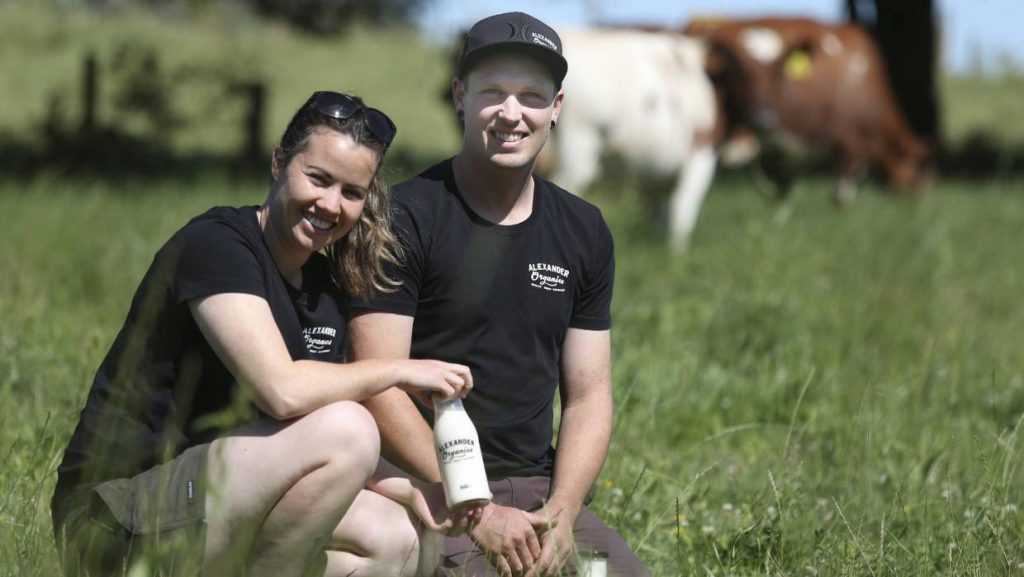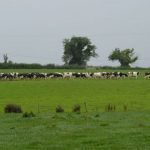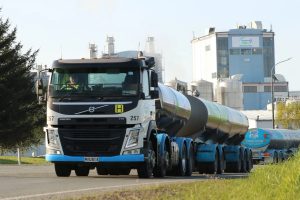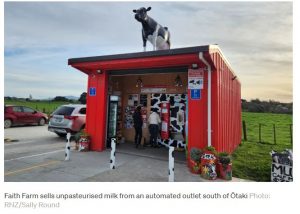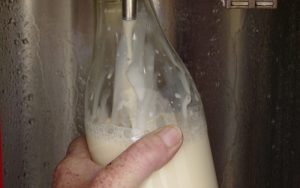
They’re specially chosen for the quality of their milk and their docile temperament – and there’s a purposeful rhythm to the work at hand.
Ellen says the cows must stand patiently for half-an-hour while they go through the rigorous procedures required for raw milk production. It takes almost three times longer than for a factory supply herd – and there’s not a lot of chat going. Ellen says the cows generally like to be quiet. “If you start talking to them, they can get a bit antsy.”
Each cow’s teats are washed individually with a hose and inspected by hand, the foremilk is stripped and visually checked, teats are sprayed with an iodine-based steriliser and dried with paper towels before a final inspection, and milking begins. And the creamy reason for all this extra work appears.
Journey to taste a glass of raw milk
Raw footage of reporter Rob Stock’s journey west from Auckland to taste his first glass of raw, untreated milk.
The Alexanders’ BioGro NZ certified organic dairy farm is on Flume Rd, near Cambridge. They have a factory supply herd of 90 cows, plus the hand-picked members of the raw milk herd who are kept separate from the bigger herd.
Ellen and Jesiah are on first-name terms with their sleek ayreshire-shorthorn cross cows and, during a photo-shoot on this Tuesday morning, the friendly Elsa ambles into the frame to find out what all the fuss is about. She’s one of the sources of the sweet, delicious milk that I’ve just sampled.
Milk sold in New Zealand is always pasteurised (heat-treated) and Ellen and Jesiah are a rare breed of dairy farmer, among only 24 raw milk suppliers nationwide registered with the Ministry of Primary Industries (MPI). Their untreated milk goes straight from the cows to a chiller, and the Alexanders follow stringent rules of compliance laid down by MPI in 2016.
As well as prescribed hygiene and handling practices, the milk is laboratory-tested every 10 days for high-risk diseases and the somatic cell count (checking animal health) is taken daily on-site before milk goes on sale.
The Alexanders fully support MPI’s regulatory framework, which aims at consumer safety. They are proud of their cows’ results: their clean laboratory records and the nutrient-dense, fresh milk that they love themselves and now supply to their community.
They’re more than a year into raw milk production, selling it from their seven-day Alexander Organics self-service shop on the farm. The high-tech milk dispensary system was imported from Italy; customers can use their own containers, or reusable glass bottles supplied by the Alexanders. Payment is by notes, coins or a credit stick that can be loaded with cash at the machine.
They turn over 90 to 100 litres a day at the shop ($3 per litre) and, last month they started a chiller-van home delivery run in Cambridge and Hamilton. They envisage this will help the business to grow – and to meet their financial target of breaking even in the first five years.
Jesiah says customers enjoy their milk for many reasons. Some use it to make yoghurt, butter, ice cream, mozzarella and other soft cheeses.
Today, regular Hamilton customer Rom McLennan is loading milk containers for her family into a chiller bag. She makes the trip to the farm because she considers Alexander Organics’ raw milk to be a premium product.
“We are so grateful to them for providing us with real food. The work they do is not easy; buying directly from them is our way of showing them how amazing their milk is.”
Cambridge customer Susan Hague describes the Alexanders’ milk as being alive, not dead. “And it tastes better.”
Ellen and Jesiah previously farmed conventionally and their vision for an organic unit – and a raw milk herd – grew from a visit four or five years ago to friend in Te Aroha who farms organically. Says Jesiah: “Once you see the health benefits of this, you can’t unsee it.”
They took on the lease of a 50ha property owned by Ellen’s grandfather and they’re grateful for the support they had from family and friends as they undertook the research and work required for organic certification.
Jesiah says they aspire to the pyramid effect of healthy soil, healthy pasture, healthy stock and healthy milk. They also have organic vegetables for sale from their fledgling market gardens, as well as eggs from their chickens and ducks. There are more dreams and plans for the future.
The pair believe there are many among their millennial generation who want more transparency about where their food comes – and to eat more naturally produced goods. But they don’t consider themselves organic pioneers.
“We stand on the shoulders of previous generations who have put huge effort into organic farming,” says Jesiah. “We appreciate their work, we’ve had good mentors.”
